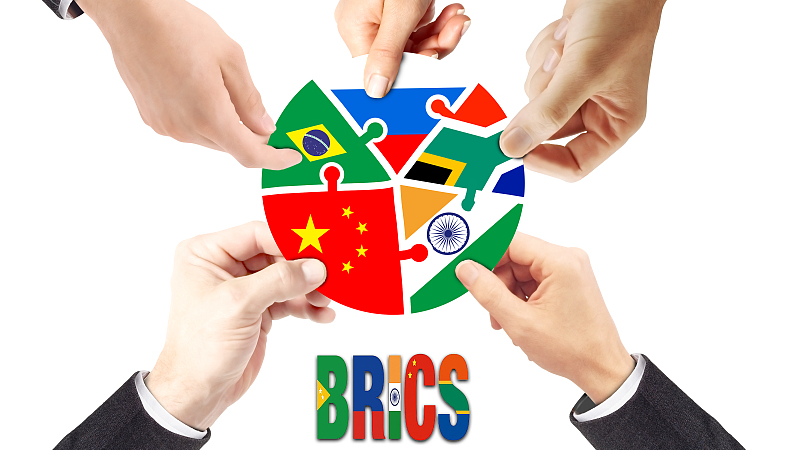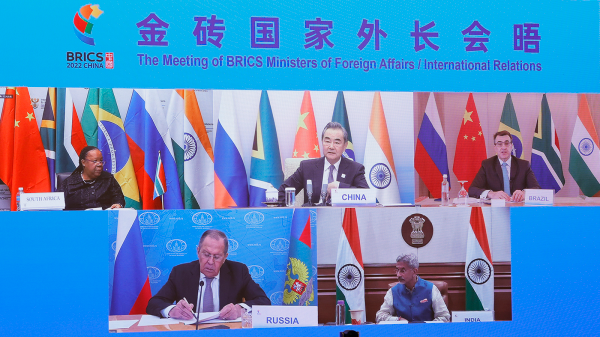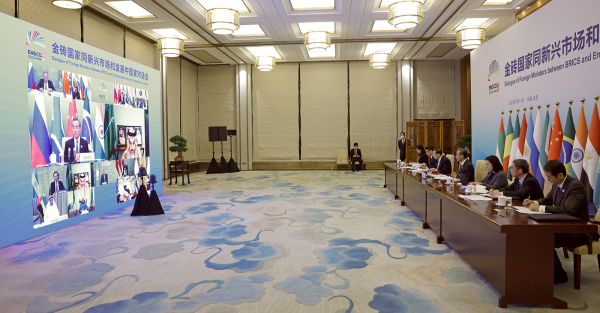
BRICS comprises the five major emerging economies of Brazil, Russia, India, China and South Africa and accounts for nearly 42 percent of the world population, 27 percent of land surface and 32 percent of global GDP. /CFP
BRICS comprises the five major emerging economies of Brazil, Russia, India, China and South Africa and accounts for nearly 42 percent of the world population, 27 percent of land surface and 32 percent of global GDP. /CFP
Editor's note: Abhishek G Bhaya is a senior journalist and international affairs commentator. The article reflects the author's opinions and not necessarily the views of CGTN.
Multilateralism – as a harbinger to a multipolar world order – for long, has been seen as a counter to the post-World War II Western hegemony in global governance.
Never before has the concept of multilateralism gained so much geopolitical traction than today when the world is grappling with the impact of a global pandemic, a prolonged military conflict in Europe that is being seen as the dawn of a new Cold War, and a declining global hegemon desperately trying to cling on to its dominance.
Multilateralism has also been the cornerstone for BRICS, a bloc of five major emerging economies spanning four continents, ever since its foundation. The bloc comprising Brazil, Russia, India, China and South Africa accounts for nearly 42 percent of the world population, 27 percent of land surface and 32 percent of global GDP (PPP) and has always remained committed to multilateral cooperation and a multipolar world order.
In the face of the current global challenges, BRICS is showing even greater resolve to multilateralism aimed at creating a more peaceful and secure world, as highlighted in the recently held BRICS Foreign Ministers' Meeting on Thursday under the chairship of China.
Chinese President Xi Jinping , while addressing the opening session of the meeting, called on the BRICS countries to reject Cold War mentality and bloc confrontation and work together to build a global community of security for all. This was clearly hinted at the geopolitics of polarization pursued by the U.S. and its Western allies wherein the world is divided in the simplistic, yet irrational, binary of allies and adversaries similar to the times of the Cold War.
Xi noted that the impacts of major changes and a pandemic unseen in a century are being combined, and factors of instability, uncertainty and insecurity are increasing in the international situation, and that BRICS could play a constructive role in dealing with these challenges.
"As a positive, inspiring and constructive force in the international community, the BRICS countries need to firm up belief, brave the storms and waves, and take real action to promote peace and development, uphold fairness and justice, and advocate democracy and freedom, so as to inject stability and positive energy into international relations in a period of turbulence and transformation," he emphasized.

Chinese State Councilor and Foreign Minister Wang Yi chaired the virtual meeting of BRICS foreign ministers, Beijing, May 19, 2022. Foreign ministers Naledi Pandor of South Africa, Carlos Alberto Franco França of Brazil, Sergey Lavrov of Russia, and S. Jaishankar of India attended the meeting. /China's Ministry of Foreign Affairs
Chinese State Councilor and Foreign Minister Wang Yi chaired the virtual meeting of BRICS foreign ministers, Beijing, May 19, 2022. Foreign ministers Naledi Pandor of South Africa, Carlos Alberto Franco França of Brazil, Sergey Lavrov of Russia, and S. Jaishankar of India attended the meeting. /China's Ministry of Foreign Affairs
Elucidating further on the topic, Chinese State Councilor and Foreign Minister Wang Yi said that in the face of unprecedented changes and turmoil, multilateralism is the guarantee for the survival of emerging markets and developing countries.
"The key to upholding true multilateralism is to adhere to extensive consultation, joint contribution and shared benefits, to advocate openness and inclusiveness, and to oppose closure and exclusion. We need to firmly uphold the international system with the United Nations at its core, oppose ganging up to form small cliques, and oppose coercing other countries into taking aside," Wang said.
The views of the Chinese sides were reflected in the joint statement released after the BRICS Foreign Ministers' Meeting. "The ministers reiterated their commitment to multilateralism through upholding international law, including the purposes and principles enshrined in the Charter of the United Nations as its indispensable cornerstone, and to the central role of the United Nations in an international system...."
They supported the call for greater representation of developing countries in international organizations and multilateral fora, including the UN and its Security Council, so that they could play an important role in global governance, according to the joint statement.
BRICS Plus cooperation and expansion
The BRICS foreign ministers also had a meeting with their counterparts from other emerging markets and developing countries including Kazakhstan, Saudi Arabia, Argentina, Egypt, Indonesia, Nigeria, Senegal, the United Arab Emirates (UAE) and Thailand under the framework of "BRICS Plus" cooperation model, introduced by President Xi in 2017 when China last hosted the BRICS Summit.
The BRICS Plus is aimed at expanding the bloc's multilateral cooperation to other developing nations and has received an enthusiastic response from many countries in the Global South.
In the same light, the bloc is now preparing for the expansion of BRICS to include other large emerging markets as members. The BRICS foreign ministers' joint statement revealed that discussions on expansion process are already ongoing and "the guiding principles, standards, criteria and procedures" for new members will be formulated through consultations and consensus among the present members.

Chinese State Councilor and Foreign Minister Wang Yi chaired the virtual meeting of BRICS foreign ministers and their counterparts from other emerging markets and developing countries, Beijing, May 19, 2022. /China's Ministry of Foreign Affairs
Chinese State Councilor and Foreign Minister Wang Yi chaired the virtual meeting of BRICS foreign ministers and their counterparts from other emerging markets and developing countries, Beijing, May 19, 2022. /China's Ministry of Foreign Affairs
At least four countries that are part of the Group of 20 (G20) largest economies of the world, including Argentina, Indonesia, Mexico and Turkey along with Bangladesh have expressed strong interest in full membership of the BRICS, while Egypt, Iran, Nigeria, Sudan, Syria and most recently Pakistan have also expressed a desire in joining BRICS. The five current BRICS countries are G20 members as well.
A BRICS expansion could multiply the global influence of the bloc while also consolidating its principle of multilateralism through greater representation of developing countries. "We need to respect the development path of each country that suits its own national conditions, promote a multipolar world, diversified civilizations and democracy in international relations, and safeguard the legitimate rights and interests of developing countries," stated the BRICS foreign ministers' joint statement.
Including new members could also help BRICS in managing the fallout of geopolitical challenges. BRICS members (barring Russia for obvious reasons) have notably remained neutral in the Russia-Ukraine conflict, while offering humanitarian aid to Ukraine and supporting peace talks between the two sides.
This is in sharp contrast to the confrontational role played by the European Union (EU), the U.S.-led NATO and G7 members that have backed one side while taking punitive actions against the other, in the process prolonging the military conflict and the resultant deaths and destruction.
With a firm grip on multilateralism and commitment towards building an equitable and multipolar world order, an expanded BRICS will have the potential to become a pivot for global growth, security and peace.
(If you want to contribute and have specific expertise, please contact us at opinions@cgtn.com. Follow @thouse_opinions on Twitter to discover the latest commentaries on CGTN Opinion section.)

